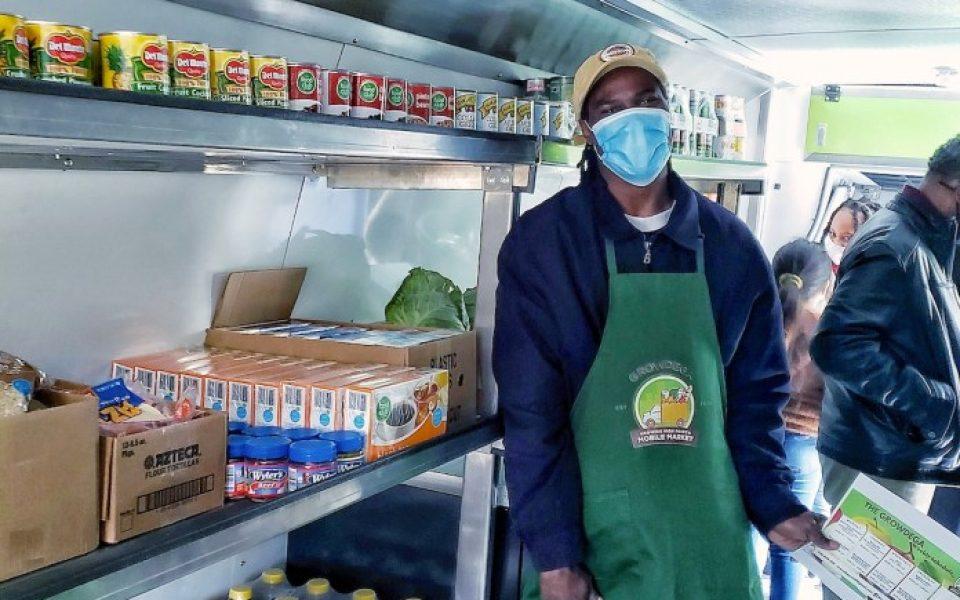Featured photo: Driver Donnie Matthews gives a tour of the interior of the Growdega mobile food market (photo by Nikki Miller-Ka)
As the wind snapped, whipping the chilled air around, Patrick Harman, executive director of the Hayden-Harman Foundation and founder of Growing High Point, spoke to a crowd of about 40 volunteers, city council members and spectators gathered for the ribbon-cutting ceremony for the Growdega mobile grocery store. Harman’s words carried off into the cold breeze, but the warmth of the socially distanced crowd on Friday, Feb. 26 made the affair intimate and memorable.
Growdega, an electric-green mobile grocery made from a converted bookmobile, will service neighborhood food deserts in High Point, which is rife with them. The market’s products will include fruits, vegetables, canned goods and some personal use items like paper towels and dish detergent. The mobile grocery store will make nine stops, operating five days a week. Drivers Donnie Matthews and Carolina Vacquez will alternate shifts as inventory specialists and point-of-sale cashiers. SNAP recipients will have their dollars matched courtesy of a grant from Foundation for Healthy High Point.

The drivers visited all of the sites last week to share an inventory list with neighbors and a weekly schedule.
“We have space for milk, cheese and meats, which can be ordered in advance,” said Matthews, as he gave a tour of the mobile unit. Cans of collard greens and pinto beans flanked the sides of the vehicle next to bags of fresh celery and boxes of leafy cabbage.
The name “Growdega” is a play on the Spanish word “bodega” — small, family-owned convenience stores that grew out of necessity and turned into convivial cultural touchstones in New York City and elsewhere. Bodega can also mean “storeroom” or “wine cellar.” Culturally, bodegas are neighborhood institutions. Store owners are part of the pulse of the locality, privy to the community’s goings-on.
The main purpose of this particular mobile bodega is to alleviate hunger in area food deserts. Currently, there are seven recognized food deserts in High Point. With a population of 115,000, the Greensboro-High Point area ranks number 14 on The Food Research & Action Center’s most recent national list for food hardship while the state of N.C. ranks seventh.
Independent neighborhood grocery stores in High Point are far and few between, but there are some bright spots in the otherwise bleak food insecurity outlook.

José Abreu, owner of Superior Foods and the Budding Artichoke retail grocers, is part of the solution to curb food insecurity in High Point. Not only did he supply the Growdega bus with groceries for its maiden voyage, he is one of five urban farm leaders who turned city-owned plots of land into agricultural resources for Growing High Point.
“I got into agriculture about five years ago through the High Point Food Alliance,” he said. “About three years ago, I took over an empty lot and converted it into a growing lot.”
Abreu has been operating Twin Oaks Urban Farm on White Oak Street since the spring of 2018, and channels his passion into each row, sowing leafy greens, root vegetables, squash and tomatoes for food boxes and now for the Growdega.
“I was born in the Dominican Republic on a coffee farm,” he says. “My parents worked in bodegas in and around New York City.”
His uncle was the previous owner of Superior Foods and Abreu took over the business more than 10 years ago. Abreu’s work is part of a natural progression. The link in the food chain not only begins with him, they are expanding and growing with him too. He is a purveyor, he’s become a broker, a farmer, a producer and a leader in the community.
To the future Growdega customers and neighbors outside of the designated food deserts, it may look easy. Many hands make light work but the project includes many contributors to make it a reality.
“That’s the magic of community,” said Harman. “This magic is real. It’s not sleight of hand. That’s the story of Growdega.”
Learn more about the Growdega on their Facebook here.
Join the First Amendment Society, a membership that goes directly to funding TCB‘s newsroom.
We believe that reporting can save the world.
The TCB First Amendment Society recognizes the vital role of a free, unfettered press with a bundling of local experiences designed to build community, and unique engagements with our newsroom that will help you understand, and shape, local journalism’s critical role in uplifting the people in our cities.
All revenue goes directly into the newsroom as reporters’ salaries and freelance commissions.


Cannedega would be a more fitting name.